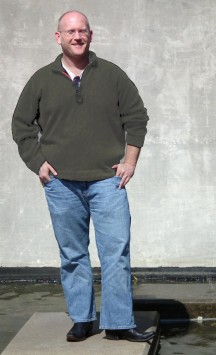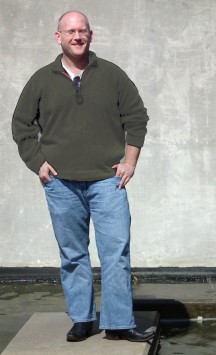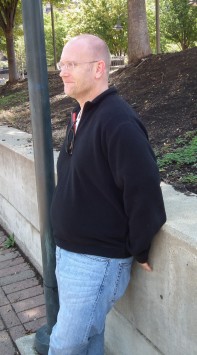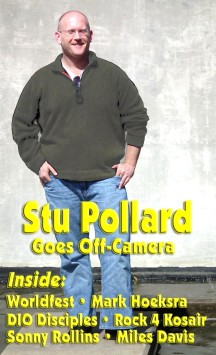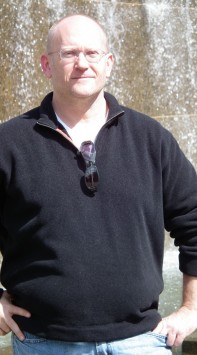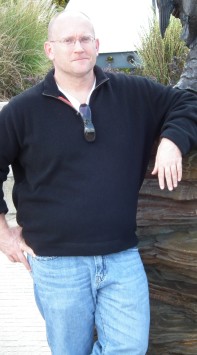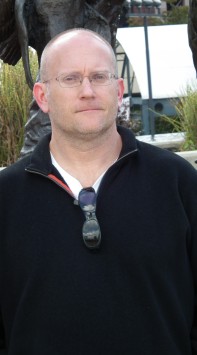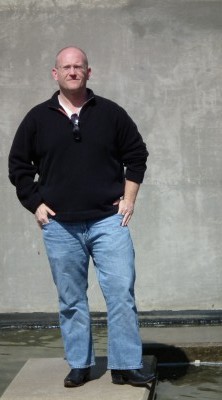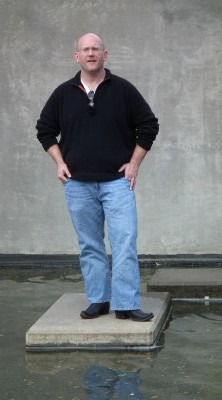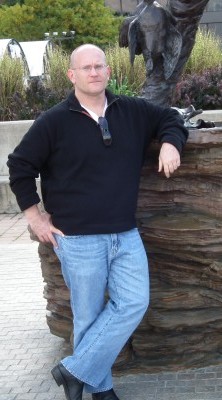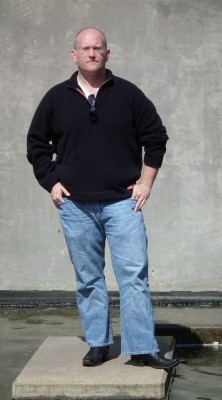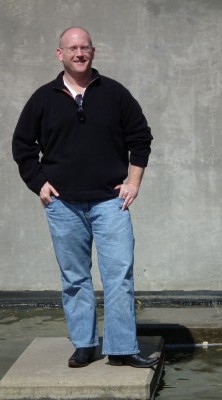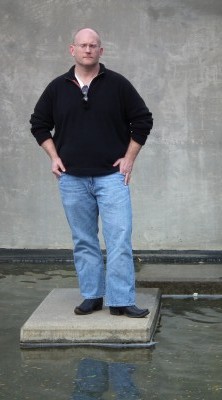social bookmarking tools:
 |
|
| Available RSS Feeds |
|---|
 - Top Picks - Top Picks |
 - Today's Music - Today's Music |
 - Editor's Blog - Editor's Blog
|
 - Articles - Articles
|
Add Louisville Music News' RSS Feed to Your Yahoo!
|
Stu Pollard Goes Off-Camera
Stu Pollard never set out to be a songwriter or a musician. Sure, he loved music as a kid and was into it during the '80s in a big way – weren't we all? – but his first love was filmmaking.
So no one was more surprised than he when he realized he was making an album of original songs.
"None of this was ever conceived as an album," Pollard said. "It was one step at a time."
Working with Louisville producer Todd Smith, whom Pollard met while working on his film "Keep Your Distance," recording sessions happened erratically. Since Pollard, a Louisville native, lives and teaches film in California now, they couldn't have hurried the project along even if they'd wanted to.
"We didn't do this in a weekend," Pollard said. But he explained that his first motivation came in "messing around" with recording music during the filmmaking process. Also, since funding is so difficult to obtain for making movies these days, recording music was something that was "a little bit more attainable.
"Which is just long way of saying it's cheaper to produce a record than a film," he concluded.
And, when the multiple sessions and experimentation was all said and done, several years of recording turned into New Tricks, a nine-track solo album of pop/R&B tunes written and sung by Pollard. It was a long time coming, and Pollard basically said that, once it was all said and done, he felt the recordings were good enough to be served up to the public.
"A lot of the songs are songs I wrote just for me, but the recording has turned out well enough that it deserves to be given release commensurate with the heart and soul that went into it," Pollard said.
And he isn't just talking about his own efforts. He heaps credit and praise on Smith and a host of backing musicians who stepped up to help out. For Smith, the long process had its good points and its challenges, but was worth the ride.
"The disadvantage is obviously that it is harder to get together," Smith said, referring to the distance, "and takes longer to finish.
"But there advantages to spreading a project out like that over space and time; longer periods between sessions allows for complete gestation of ideas, for new ideas to develop, to live with the tracks and really see what is working. When you crunch it, you inevitably come back later and say, 'Oh, I wish we would have done this or that;' there are literally none of those moments on Stu's record."
HOW DO THESE THINGS GET STARTED, ANYWAY?
Pollard recalls loving the song "Action" by Sweet.
"That's one where they actually shut off tape deck at end of recording so it slows down," he said.
He also was a fan of the soundtrack to the film Midnight Express, created by synth-master Giorgio Moroder. The 1978 film won an Oscar for Best Music. He also listened to a lot of his father's Pink Floyd, Steve Miller and KC and the Sunshine Band records as a kid, and eventually developed a love for R&B – he cites Stevie Wonder, Earth Wind & Fire and George Benson has influences.
He became a DJ during high school and college and ended up buying a used synthesizer on which he began writing and recording song demos.
He would then go on to run sound for a variety of bands during college, in particular working with a guitar player named Doug Derryberry, who would play on New Tricks.
But the true impetus for the album really began as a necessity during the making of his late 1990s film, Nice Guys Sleep Alone.
"There was composer who worked on that film named Stephen Graziano," Pollard said. "We were working on the score of the picture, and I realized there were a few places where I needed some needle drops. Anytime you use a song in a movie, there is a license fee involved."
To save money, Pollard created some songs for that, even doing a rap number. "I played to the comedy," Pollard said. "[Graziano] kept saying, 'Huh, that wasn't half bad.'"
But it wasn't until the making of Keep Your Distance that the true seeds of New Tricks began to take root. The soundtrack to that film was filled with Louisville music, from Code Red to Artgeko to Digby to Peter Searcy to the Muckrakers, many of whom had worked with Smith.
"Todd entered the equation in post production, and we needed the needle drops," Pollard said. A Pollard original called "Right in Front of You" had made it onto the soundtrack, and Smith showed interest in hearing more of Pollard's tunes.
"He coaxed me into the studio one night after we'd had a couple beers" to work on another original, Pollard said, "and that song ended up being song five on the new CD."
So he started to dig back into his catalog of songs, finished and otherwise. "I have always had a piano or keyboard where I live," Pollard said, "just as a way to mess around or express myself or distress or whatever, not really thinking it would turn into something I would record, per se."
But it did.
"The songs on New Tricks are a combination of songs that go back really far," Pollard said, "although the lyrics for the most part are fairly recent."
"I had worked with Stu on the soundtrack to his movie Keep Your Distance," Smith recalled. "He told me he had been doing some writing, and played me some of his songs. I thought they were really good and we started talking about what they could sound like with some production; next thing you know, we were laying down tracks."
MOVIES VERSUS ALBUMS
"One thing I always tell my students," Pollard said, "is that if you aren't stepping outside your comfort zone and challenging yourself just about every day, you are going to be unfulfilled creatively. … I looked at making this record like I would at making a film. I get to work with a lot of cool people [on a film], and making a record is certainly no different in that regard."
And it's a different kind of "cool people," as well, he is quick to note.
"I hold people who make music in a very high degree of reverence, and even more so when you see just how crowded the marketplace is," Pollard said. "It's a special ability to be able to make so many people happy."
That doesn't mean it isn't a tricky proposition, however. "The good news is that with click of button or two you can have worldwide distribution," he said, "but the question is, is anybody going to pay for it?"
It is no different with making movies – Pollard said it is easier than ever to make a movie right now, but it has never been riskier.
"It's a tricky time to be out trying to make movies independently, because the marketplace is crowded," he said. He has a number of different screenplays in front of him currently that "probably deserve to be made," but it's a matter of waiting for the right investors.
And with more and more Internet bandwidth available, movies are going the way of MP3s, in a sense. It's easy to download whole movies to a hard drive these days.
"One interesting part of teaching is … a lot of [my students] are so computer savvy, they don't pay for content," he said. "I say, 'You do realize the more you do that, the more you are also cannibalizing your own career?'"
And so, Pollard decided to get behind a keyboard and microphone instead of a digital camera. According to Smith, Pollard flashed impressive talent in his music recording debut.
"I was very surprised by the quality of Stu's material, and his voice," Smith said. "Everyone knows him as a 'film guy,' but that doesn't necessarily translate into music. The songs are well written lyrically and melodically, and his voice has a really nice, pleasing tone, good pitch, good delivery." ("Minimal Pro-tooling," Smith added.)
Pollard's directorial skills, however, apparently translated well to the recording process.
"Stu is very organized in session; anyone who knows him will not be surprised by that comment," Smith said. "He would come in with goals and an agenda for each session, which I appreciated very much given our limited time, and in contrast to many artists who couldn't organize their way out of a paper bag."
In the end, they wound up with nine tracks, the last one on the album being alternate versions of the tracks "By Design" and "I Swear I Can See," the later being a rap version. "There Comes a Time" is the one that stands as the first "single," if you will. It is a full-on tribute to the 1980s, complete with Phil Collins-inspired horns and a soulful pop groove.
The production is professional all the way, and includes a wide range of guests from Smith on bass and Derryberry on guitar, to drummer Gerry Hansen, vocalist Lesley McFerron and percussionist Jake Englert. Other guests include Micah Gerdis, Andy Mill, Derek Siebert, Terry Turner, Jacob Duncan and Manfred Rhodes.
Whew.
And then there was more to do.
BACK TO THE CAMERA
That's right, for any good song, there is a good video, and Pollard was just the guy to make that happen. The first video, which is now on YouTube, is for "There Comes a Time," and takes the 1980s tribute another step or two.
Videos for "Unconditional" and "By Design" are also complete and will be available on YouTube soon.
A couple of his students agreed to help out in this project, and Pollard also got plenty of support elsewhere.
"We ended up getting a ton of support from the production community," he said. "Tons of people donated resources and time."
In the end videos by Phil Collins such as "I Missed Again" and "Easy Lover" served as inspiration, as did the memorable Robert Palmer videos of that era. You probably know where this is going.
There were seven "Palmer girls," as Pollard called them, who were played by friends and a few people from a local talent agency. The videos all were shot at Butchertown Pub Studios – yes, located at the former site of the revered Louisville night spot – which is operated by Smith.
The video for unconditional is a fun romp in the outdoors, complete with lots of kids and dogs, while the "By Design" video is more stylistic and dark. Bottom line, is Pollard happy with the results?
"The short answer is yes, I'm thrilled," he said. "In a lot of ways, I'm not 100 percent sure what I expected."
For the first video, Alison Kightlinger provided choreography. Pollard was required to not only lip-synch, but try his hand – and feet – at some rhythmic dance moves. Talk about being out of one's comfort zone.
"The day before we shot that, I guess I was as uncomfortable, in terms of nausea and nerves, as I've ever been," he said. "But thank goodness I did it. I'm not switching careers, but I would be hard-pressed to say we didn't pull it off. It winks at itself enough that no one can say it was taking itself too seriously."
And the song itself actually features a bit of word play. Pollard, an Atlanta Falcons fan, used as many sports clichés as he could to build the lyric, metaphorically translating them into a song about a relationship.
All in all, the experience for a "film guy" like Pollard has been cathartic and fulfilling.
"If you ever have the opportunity to make a record you should, because there is no reason not to," he said. "Most people who want to make movies don't get to, and it's probably the same with music."
And he isn't at all worried about climbing the Billboard charts. At the very least, he's marked off a major item from his bucket list. The fact New Tricks was a side project meant there was never any real pressure.
"In a way," he said, "it's a compliment just to be listened to."

